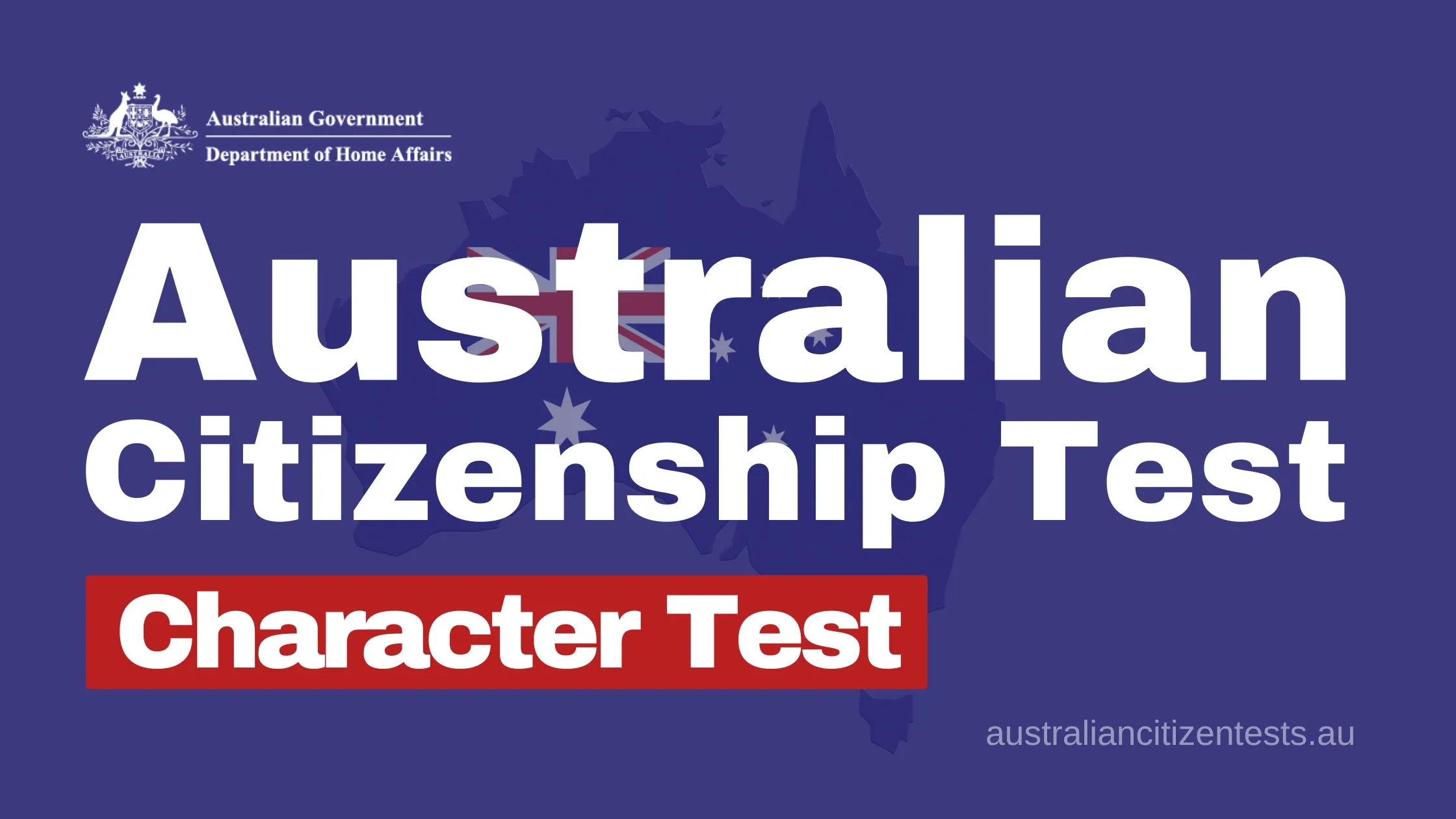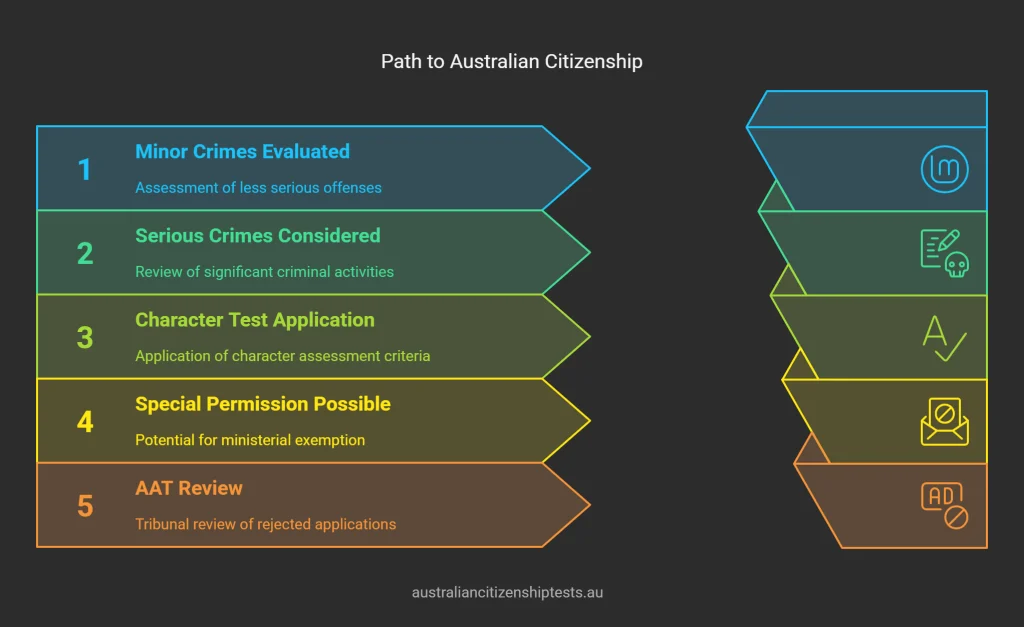
The character test is part of the Australian Citizenship Test. It ensures that people applying for citizenship share Australia’s values and follow its laws. The citizenship test checks an applicant’s knowledge of Australia’s history, government, and values. The character test, on the other hand, looks at whether the person shows honesty, respect for the law, and good behavior. This step makes sure that only those who support fairness, equality, and responsibility can become citizens.
The character test also helps protect national security and build trust in the community. Citizenship gives people important rights, like voting and using government services. It’s important that new citizens are positive contributors to society. The test stops people with serious criminal records or bad behavior from becoming citizens. By including the character test, Australia ensures its future citizens follow the law and help create a safe, united, and inclusive society.
What is the Australian Character Test?
The Australian Character Test checks if people applying for citizenship are honest, follow laws, and can be trusted. You need to share a police check (like one from the Australian Federal Police) and tell them if you’ve ever been in jail, have pending charges, or hid past crimes. They look at your criminal history—like violence or fraud—to decide. Lying on your form will fail you.
Example: If you got a speeding ticket years ago but didn’t mention it, your application could be denied.
Who Must Take the Character Test?
All adults applying for citizenship must take the test, especially if they’ve lived in Australia for over a year. The Department of Home Affairs automatically checks people with a criminal record—even from other countries. If you’re a permanent resident, you’ll need a police check from every country you’ve lived in.
Important Cases:
- People with past crimes (even small ones).
- If you’ve moved countries a lot.
- If you’re waiting for a court decision (pending charges).
10-Year Rule for Criminal Records
Australia’s 10-year rule means some old crimes (like small theft) might not hurt your application if they’re “hidden” under the Spent Convictions Scheme. But serious crimes (like assault) stay on your record forever. You must still tell them about all crimes, even old ones.
Why It Matters:
- Hidden crimes (spent convictions) don’t always mean approval.
- Officers can still reject you if they think you’re a risk.
Minor vs. Serious Crimes: What’s the Difference?
Small crimes (like traffic tickets or shoplifting) won’t fail you if you tell them. But big crimes (like drug trafficking or abuse) mean instant rejection. A review board (AAT) might approve you for small mistakes, but getting special permission from a government official is rare for big crimes.
- Small crime + honesty = okay.
- Big crime + lying = application canceled.

How Criminal Records Affect Citizenship
Having a criminal record can affect your chances of becoming an Australian citizen. The government uses strict rules called the Character Test (Section 501) to decide. Small crimes like speeding tickets might not stop your application, but big crimes like violence or fraud usually mean automatic rejection. In rare cases, a government minister might grant special permission to approve someone with a criminal record.
If your background check fails because of past crimes, you can ask the Administrative Appeals Tribunal (AAT) to review your case. They look at things like:
- Minor crimes (e.g., shoplifting) vs. serious crimes (e.g., assault).
- How long ago the crime happened.
- Proof that you’ve changed (like volunteer work).
What Counts as “Bad Character”?
Australia’s Migration Act 1958 says you’ll fail the character test if you:
- Have a history of deportation (being kicked out of the country).
- Are linked to terrorism or have an Interpol Red Notice (global arrest warrant).
- Fail a security check by ASIO (Australia’s security agency).
Even small repeated crimes (like multiple DUIs) can show a pattern of “bad character.” This might lead to deportation or citizenship denial.
How to Prove You’re a “Good Person”
To pass the test, provide:
- A police check from every country you’ve lived in.
- Signed statements from friends/employers saying you’re honest.
- Proof of community service or job history.
If your application is rejected, the AAT might approve it if you show:
- Rehabilitation proof (e.g., therapy certificates).
- Character references (e.g., from a teacher or boss).
Forms & Processes
Key Forms and What They’re For
When applying for Australian citizenship, you’ll need specific forms to prove your identity, background, and eligibility. Here’s a simple breakdown:
- Form 1300t: The main form for most applicants. Use this if you’re applying based on living in Australia for 4+ years.
- Form 1290: For special cases, like if you’re stateless, under 18 without a parent, or need exceptions.
- Form 1195: A photo ID form—someone like a doctor or teacher must sign it to confirm your identity.
- Form 1399: Only if you’ve served in the Australian Defence Force (military service).
All forms are submitted online through ImmiAccount, the government’s portal managed by the Department of Home Affairs.
What’s the Difference Between Form 1300t and 1290?
- Form 1300t = Standard application. You’ll need proof of residency (e.g., bills, school records).
- Form 1290 = For special circumstances, like refugees, stateless people, or kids applying alone.
Required Documents Checklist
To avoid delays, include these required documents:
- Form 1195 (signed ID photo).
- Passport scans or birth certificates.
- For military applicants: Form 1399 + service records.
- Police checks from every country you’ve lived in for 12+ months.
Exemptions & Special Cases
Some people don’t need to take Australia’s character test but still qualify for citizenship. The Department of Home Affairs allows this in special situations, like:
- Age 60+ exemptions: Seniors skip the test but still need a police check.
- Diplomatic protection: Government workers from other countries might not need checks.
- NZ citizens under special Australia-New Zealand agreements.
Even with exemptions, the government can still use special permission from a minister to review risky cases.
What Happens If You Fail the Character Test?
Failing Australia’s character test means your citizenship application is rejected, and you may face legal issues like visa cancellations. However, you can appeal the decision to the Administrative Appeals Tribunal (AAT)—a review board that checks if the rejection was fair.
Consequences of Failing
- Citizenship denial: You can’t become a citizen until you pass the test.
- Visa risks: Your permanent residency might be reviewed.
- Future applications: Failures stay on your record, making reapplying harder.
How to Appeal
- AAT appeal: Submit evidence (like proof of rehabilitation) within 21 days.
- Ministerial Intervention: A special government team can override the decision in rare cases (e.g., family hardship).
- Reapply later: Fix issues (e.g., finish probation) and try again.
Steps to Pass the Character Test for Citizenship
To pass the character test, you need a police clearance certificate (called a National Police Check). Here’s how:
- Apply online: Use the Australian Federal Police (AFP) website. Choose the “immigration/citizenship” purpose.
- In-person option: Visit a state police agency (like NSW Police) if you prefer paper forms.
- Wait 1–4 weeks: Costs around $42.
How to Get Strong Character References
Australia requires 2–3 character references from people who’ve known you for over a year. Who can be a referee?
- Employers, teachers, or coworkers.
- Community leaders (e.g., sports coaches, religious figures).
- A professional (like a doctor or lawyer).
Steps to write a good reference:
- Use Form 1195 (an official ID form) if your referee is a qualified professional.
- Include their contact details and how long they’ve known you.
- Ask them to write: “I confirm [Your Name] is honest and follows Australian laws.”
FAQs
Can small crimes (like traffic tickets) affect my citizenship application?
Yes, but only if you hide them. Small crimes (e.g., parking tickets, minor theft) won’t fail your application if you tell the truth. Australia cares more about honesty than old mistakes.
Can I travel to New Zealand with a criminal record?
Maybe. New Zealand does its own police check when you arrive. Even if Australia approved you, NZ can block entry for serious crimes (e.g., DUIs, violence).
Can I appeal if I fail the character test?
Yes! You have 21 days to ask the review board (AAT) to check your case. Bring proof you’ve changed (e.g., volunteer work, no new crimes). In rare cases, the government can grant special permission if your family relies on you.
